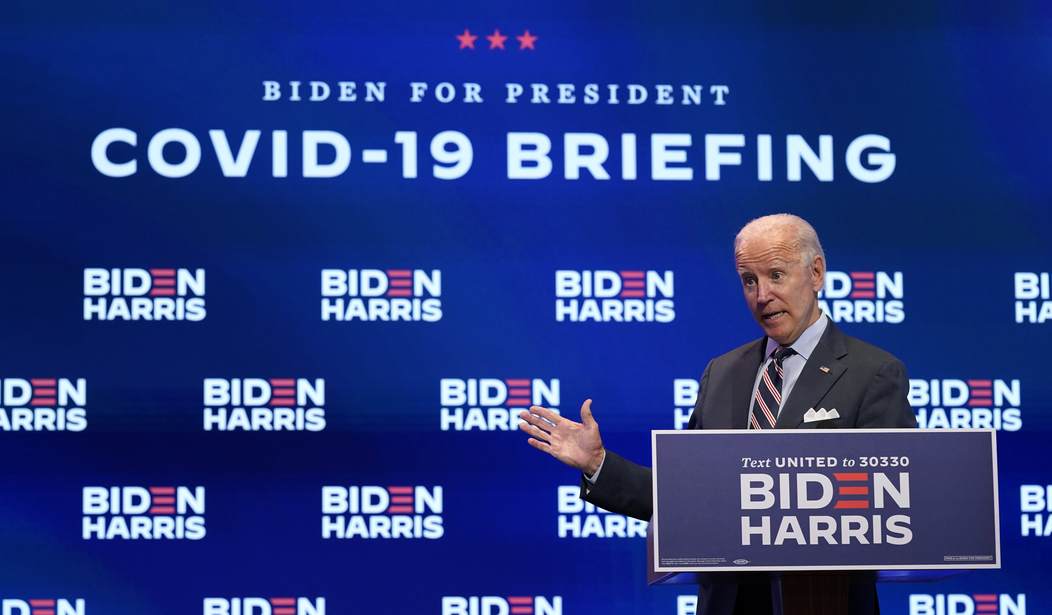When in Star Wars Admiral Motti declares his skepticism of the Galactic Empire’s supposedly foolproof plans, Darth Vader retorts, “I find your lack of faith disturbing.” A lot of doubt is going around these days in a galaxy much closer at hand. The Hill reports that “public opinion polling shows only a slim majority of Americans are willing to trust a first-generation vaccine … Vaccine skepticism emerges as early test for Biden.
The incoming Biden administration will face an immediate challenge persuading a skeptical American public to take a COVID-19 vaccine when one becomes widely available.
Health officials, including the nation’s top infectious diseases expert, Anthony Fauci, say at least 70 percent of the U.S. population will need to take the vaccine to control the virus in such a way that future outbreaks will be easily managed and life can get back to normal.
But public opinion polling shows only a slim majority of Americans are willing to trust a first-generation vaccine. Those numbers are significantly lower among Black and Latino respondents – two of the hardest hit demographics.
In new polling from Ipsos released Tuesday, 51 percent of respondents said they will take a vaccine immediately when one becomes available.
Faith, whether in the honesty of elections or the efficacy of vaccines, is in short supply at the very moment politicians are claiming a mandate. Authority figures are becoming increasingly strident even as the public becomes increasingly deaf to their mandates. CBS News says that millions are ignoring travel warnings as COVID-19 cases surge nationwide. “Despite blunt warnings from public health officials pleading for people to stay home this Thanksgiving, millions are hitting the skies and roads anyway.” The Washington Post laments that “officials tell the public to stay home to stop the spread of covid. But is anyone listening?”
Airlines are pushing back against proposals requiring mandatory vaccine certificates prior to boarding.
The peak body representing the world’s airlines has distanced itself from Qantas’ compulsory vaccination stance, saying the policy is a “bit premature” and that testing was more critical than vaccines.
The CEO of the International Air Transport Association (IATA), Alexandre de Juniac, was speaking in Geneva following the association’s annual general meeting which called on governments to end quarantine and border bans and replace them with testing….
Juniac said that even if the vaccines prove viable next year, it would take the global aviation industry at least four years to recover from the swathe of travel bans and restrictions imposed around the world as a result of the coronavirus pandemic.
“We cannot wait for the vaccine to be deployed, otherwise we’ll all be dead.
Some of this loss of credibility comes from the overuse of apocalyptic predictions to browbeat populations into lockdown. And yet the crisis keeps getting bigger in the news. For example, the prestigious Lancet now describes Covid-19 as a syndemic.
As the world approaches 1 million deaths from COVID-19, we must confront the fact that we are taking a far too narrow approach to managing this outbreak of a new coronavirus. We have viewed the cause of this crisis as an infectious disease. All of our interventions have focused on cutting lines of viral transmission, thereby controlling the spread of the pathogen. The “science” that has guided governments has been driven mostly by epidemic modellers and infectious disease specialists, who understandably frame the present health emergency in centuries-old terms of plague. … COVID-19 is not a pandemic. It is a syndemic.
A syndemic is not merely a comorbidity. Syndemics are characterised by biological and social interactions between conditions and states, interactions that increase a person’s susceptibility to harm or worsen their health outcomes.
To the layman, a syndemic sounds an awful lot like a chronic pandemic, something that will never go away. This is the kind of rhetoric that invites disillusionment and despair. Since such alarming characterizations may not be confirmed by the “anecdotal” experience of individuals (like this British doctor whose patients have scarcely been affected) some may even regard exhortations, like Oregon Gov. Kate Brown’s urging that people call cops on COVID-19 rule-breakers, as exercises in tyranny.
This is exacerbated by the hypocrisy of public figures like the Denver mayor who urged residents to “stay home as much as you can” but traveled out of state himself to visit family for Thanksgiving or Governor Gavin Newsom, who was photographed dining unmasked with lobbyists at an expensive French restaurant even as he closed small businesses for public health reasons.
Nor is confidence boosted by the inevitable errors of science itself. “AstraZeneca Plc’s Covid-19 vaccine looks like it’s headed for an additional global trial as the drugmaker tries to clear up uncertainty and confusion surrounding favorable results in its current study.”
Questions are mounting over one of the fastest-moving shots after the company acknowledged that a lower dosage level that appeared more effective resulted from a manufacturing discrepancy. The company and its partner, the University of Oxford, didn’t initially disclose the error and other key details, leading to concern over their transparency.
Mistakes do happen in all-too-human scientific institutions. But to a public taught to “trust the science” the realization that the people in white coats may be fallible, especially on the frontier of knowledge, can come as an emotional shock. The left-wing Guardian describes the remarkably corrupt world of scientific publishing.
It is as if the New Yorker or the Economist demanded that journalists write and edit each other’s work for free, and asked the government to foot the bill. Outside observers tend to fall into a sort of stunned disbelief when describing this setup. A 2004 parliamentary science and technology committee report on the industry drily observed that “in a traditional market suppliers are paid for the goods they provide”. A 2005 Deutsche Bank report referred to it as a “bizarre” “triple-pay” system, in which “the state funds most research, pays the salaries of most of those checking the quality of research, and then buys most of the published product”. …
Many scientists also believe that the publishing industry exerts too much influence over what scientists choose to study, which is ultimately bad for science itself. Journals prize new and spectacular results – after all, they are in the business of selling subscriptions – and scientists, knowing exactly what kind of work gets published, align their submissions accordingly. This produces a steady stream of papers, the importance of which is immediately apparent. But it also means that scientists do not have an accurate map of their field of inquiry. Researchers may end up inadvertently exploring dead ends that their fellow scientists have already run up against, solely because the information about previous failures has never been given space in the pages of the relevant scientific publications. A 2013 study, for example, reported that half of all clinical trials in the US are never published in a journal.
Ordinarily, truth is gradually validated by human experience, but the political urgency of the pandemic has left societies stampeding themselves into action. By depicting coronavirus apocalyptically they have drummed up a sense of crisis that makes a mass, perhaps mandatory inoculation almost obligatory despite any lingering misgivings. After all that crisis talk, the politicians can hardly say “great, we have 3 vaccines. Now let’s test it for two more years.”
With any luck, the emerging vaccines will work the first time out without significant glitches. But the worst-case scenario, at least from the standpoint of restoring faith in institutional authority, was posited by the New York Times. What if the virus won’t stop evolving when the vaccine arrives?
“We have no guarantee that the natural evolutionary competition of viruses with the human species will always find ourselves the winner.”…
But vaccines won’t put an end to the evolution of this coronavirus, as David A. Kennedy and Andrew F. Read of The Pennsylvania State University, specialists in viral resistance to vaccines, wrote in PLoS Biology recently. Instead, they could even drive new evolutionary change.
There is always the chance, though small, the authors write, that the virus could evolve resistance to a vaccine, what researchers call “viral escape.” They urge monitoring of vaccine effects and viral response, just in case….
Dr. Duprex and his colleagues posted their study online Nov. 19. It has not yet been published in a peer-reviewed journal. The researchers are now infecting animals with deletion-mutant viruses to better understand the risk they may pose to vaccines.
“Well, this paper does nothing to reduce the anxiety!” Dr. Read said in an email. “This is early data strongly suggesting the virus has the potential to escape human immunity.”
No plan survives contact with the enemy, not even a medical plan. Nature is a tough enough opponent without taking human malice into account. And malice, if not present from the start in the form of China, has made a belated appearance with suspected North Korean hackers targeting COVID vaccine maker AstraZeneca.
The hackers posed as recruiters on networking site LinkedIn and WhatsApp to approach AstraZeneca staff with fake job offers, the sources said. They then sent documents purporting to be job descriptions that were laced with malicious code designed to gain access to a victim’s computer.
Of all the quantities that have been run down over the last decade, trust in the institutions is among those at the lowest level. Publics, which entered the 21st century expecting the End of History, have lived to see the end of infallibility.
Books: The Price of Panic: How the Tyranny of Experts Turned a Pandemic into a Catastrophe by Jay Richards. The human cost of the emergency response to COVID-19 has far outweighed the benefits. That’s the sobering verdict of a trio of scholars—a biologist, a statistician, and a philosopher.
Follow Wretchard on Twitter or visit Wretchard.com










Join the conversation as a VIP Member